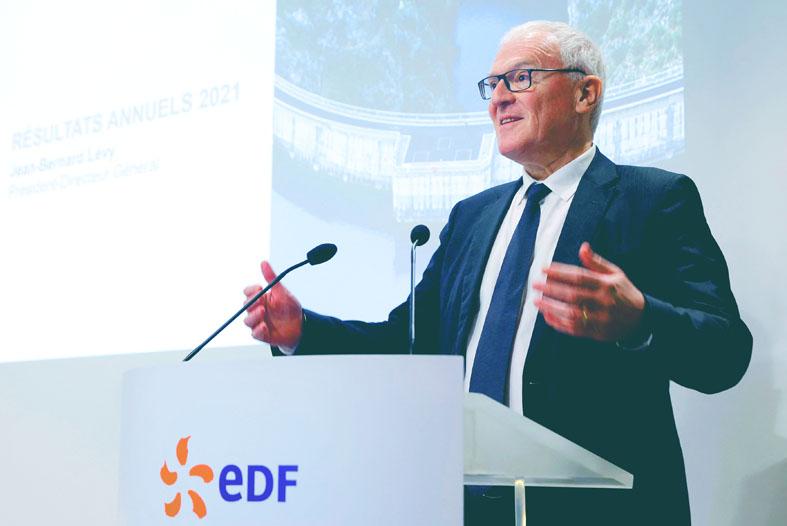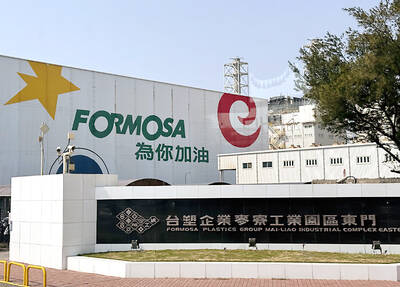Electricite de France (EDF) SA and the French government yesterday said the process of finding a new CEO for the power utility has begun, a day after the government announced its plan to fully renationalize the debt-laden power giant.
“The state and Jean-Bernard Levy have agreed to launch the succession process from now,” the French Ministry of Economy and Finance, which manages the state’s 84 percent stake in EDF, said in a statement.
EDF confirmed the decision, adding in a separate statement that CEO Levy, whose term officially ends next year, was prepared to step down as soon as a successor is found.

Photo: Reuters
Asked on the ideal profile for the top job at EDF, French Minister of the Economy and Finance Bruno Le Maire said he was looking for somebody with a “sense for compromise,” referring to EDF’s need to navigate in a highly regulated environment while working with the utility’s strong unions.
French Prime Minister Elisabeth Borne on Wednesday announced plans to fully nationalize EDF in a move that would give the government more control over restructuring the debt-laden group while contending with a European energy crisis.
Le Maire yesterday rejected criticism that the government was nationalizing the company at a time when it is likely to incur massive losses, hit by energy price caps and years of delays on new nuclear plants in France and Britain, with budget overruns in the billions of euros.
“I deeply believe in EDF’s future,” Le Maire said.
French Minister of Public Action and Accounts Gabriel Attal earlier said it was too early to estimate the full nationalization of EDF.
“This will depend on the company’s shares,” Attal said, referring to the approximately 15 percent of the company traded on the stock market.
Buying the shares the government does not already own at current prices would cost about 5 billion euros (US$5.1 billion).

EXTRATERRITORIAL REACH: China extended its legal jurisdiction to ban some dual-use goods of Chinese origin from being sold to the US, even by third countries Beijing has set out to extend its domestic laws across international borders with a ban on selling some goods to the US that applies to companies both inside and outside China. The new export control rules are China’s first attempt to replicate the extraterritorial reach of US and European sanctions by covering Chinese products or goods with Chinese parts in them. In an announcement this week, China declared it is banning the sale of dual-use items to the US military and also the export to the US of materials such as gallium and germanium. Companies and people overseas would be subject to

Taiwan Semiconductor Manufacturing Co (TSMC, 台積電) founder Morris Chang (張忠謀) yesterday said that Intel Corp would find itself in the same predicament as it did four years ago if its board does not come up with a core business strategy. Chang made the remarks in response to reporters’ questions about the ailing US chipmaker, once an archrival of TSMC, during a news conference in Taipei for the launch of the second volume of his autobiography. Intel unexpectedly announced the immediate retirement of former chief executive officer Pat Gelsinger last week, ending his nearly four-year tenure and ending his attempts to revive the

WORLD DOMINATION: TSMC’s lead over second-placed Samsung has grown as the latter faces increased Chinese competition and the end of clients’ product life cycles Taiwan Semiconductor Manufacturing Co (TSMC, 台積電) retained the No. 1 title in the global pure-play wafer foundry business in the third quarter of this year, seeing its market share growing to 64.9 percent to leave South Korea’s Samsung Electronics Co, the No. 2 supplier, further behind, Taipei-based TrendForce Corp (集邦科技) said in a report. TSMC posted US$23.53 billion in sales in the July-September period, up 13.0 percent from a quarter earlier, which boosted its market share to 64.9 percent, up from 62.3 percent in the second quarter, the report issued on Monday last week showed. TSMC benefited from the debut of flagship

TENSE TIMES: Formosa Plastics sees uncertainty surrounding the incoming Trump administration in the US, geopolitical tensions and China’s faltering economy Formosa Plastics Group (台塑集團), Taiwan’s largest industrial conglomerate, yesterday posted overall revenue of NT$118.61 billion (US$3.66 billion) for last month, marking a 7.2 percent rise from October, but a 2.5 percent fall from one year earlier. The group has mixed views about its business outlook for the current quarter and beyond, as uncertainty builds over the US power transition and geopolitical tensions. Formosa Plastics Corp (台灣塑膠), a vertically integrated supplier of plastic resins and petrochemicals, reported a monthly uptick of 15.3 percent in its revenue to NT$18.15 billion, as Typhoon Kong-rey postponed partial shipments slated for October and last month, it said. The